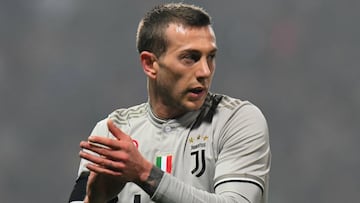Bernardeschi, not Ronaldo, Allegri's most important weapon
He made a decisive contribution to the defeat of Atletico Madrid. Now, Federico Bernardeschi looks like one of Juventus' key components.

It was, inevitably, all about Cristiano Ronaldo. Another hat-trick, another Champions League knockout win, another match leaving Atlético Madrid fans wishing he had never put on a pair of football boots.
But while Ronaldo took the plaudits for firing Juventus to a 3-0 win last month, head coach Massimiliano Allegri felt it prudent to praise another of his forwards.
"Federico Bernardeschi did really well," Allegri said to Sky Sport Italia. "It's a step forward for Bernardeschi and I am well aware of how good he is. We needed a great performance to go through and we did it."
Bernardeschi only played 10 minutes of the first leg of the last-16 showdown, as Juve lost 2-0 in Spain. He started the second and played a crucial role in two of the three goals that turned the tie on its head.
As Juve prepare to take on Ajax in the quarter-final first leg, the 25-year-old seems almost certain to be involved, despite starting only twice away from home in the competition this season. In short, he has become essential to Allegri's plans. But what makes him so important?
WINNING THE NUMBERS GAME
It's more than a classic... it's about a tale of champions! 🏳🏴#AjaxJuve #ForzaJuve #FinoAllaFine #GETREADY pic.twitter.com/3ThX0h01F6
— JuventusFC (@juventusfcen) April 8, 2019
To put it bluntly, Juve are better with Bernardeschi in the team - because he makes them, well, less blunt.
The Old Lady have an 88 per cent win ratio from 17 games in all competitions with Bernardeschi in the starting line-up, which drops to 76 per cent from 25 matches without him.
Juve also average more goals (2.1 compared to 1.8) and fewer conceded (0.6 compared to 0.8) when the Italy international is in the first XI.
Interestingly, their number of shots drops from 17.4 to 15.6 per game when Bernardeschi starts. In other words, they seem to become more clinical when he is involved - even if it is not he who is scoring the goals.
WHAT MAKES HIM SO EFFECTIVE?
For one thing, his versatility.
Bernardeschi started wide on the right against Atlético but switched to the left to provide a sublime cross for Ronaldo's first goal. His driving run into the penalty area, which drew a foul and allowed Ronaldo to complete the comeback, came after he had been moved centrally to accommodate Paulo Dybala and Moise Kean.
As Italy boss Roberto Mancini put it recently: "Federico has great qualities given his age. I think he can become a player who scores a lot of goals, which he still lacks. He has the technical qualities to do it. He can play different roles and this is a great advantage for him and his coaches."
That potency across the front three makes him incredibly useful. His pace gives Juve good balance when he plays out wide and a huge threat on the counter-attack when he is moved centrally. It also makes man-marking extremely difficult and leaves defences, even those as redoubtable as Atleti's, at risk of giving space to Ronaldo.
When you add the fact that only Ronaldo, Juan Cuadrado and Miralem Pjanic have created more than his 11 chances in the Champions League this season, it makes Bernardeschi a thoroughly dangerous prospect.
WHAT ABOUT DYBALA?
That’s why #FinoAllaFine is our motto! WHAT A COMEBACK!!! Thank you everyone! 🔥💪🏼
— Federico Bernardeschi (@fbernardeschi) March 12, 2019
Ecco perché #FinoAllaFine è il nostro motto!
CHE RIMONTA!!! Grazie a tutti! 🙏🏼⚪️⚫️#UCL #ForzaJuve pic.twitter.com/kgigbbT5wu
It was Dybala who was sacrificed from the starting line-up for Bernardeschi against Atleti at the Allianz Stadium, and it could happen again this week.
That might seem unfair when you compare the pair's numbers. Dybala has scored or assisted 14 goals in all competitions this season, double the number of Bernardeschi. He also averages more shots (2.2 to 1.8), more chances created (1.6 to 1.3) and more dribbles completed (1.5 to 1.1) per match.
The problem is Dybala has never boasted the same adaptability. Playing him out wide often leaves Juve suspect defensively, especially given João Cancelo's attacking proclivities. He is also slower, with and without the ball, which can deprive the forward line of a certain dynamism that Bernardeschi brings.
But perhaps Bernardeschi best sums up the difference between the two.
"I've always said that my real strong point is my mental strength, more than my technical or physical attributes," he told UEFA.com. "It gives me that little edge when it comes to reaching my goals."
Related stories
Dybala is a wonderfully gifted footballer, but questions about his temperament, his ability to handle the pressure of a big occasion, have dogged much of his career. He outshone Lionel Messi in the Champions League quarter-finals two years ago, scoring twice in a 3-0 defeat of Barcelona, but has only managed one goal in the knockout phase since. He got the only goal at Old Trafford in the group stage, but he drew blanks in a 2-1 home loss to Manchester United and both of the Atlético matches.
Bernardeschi, meanwhile, seems ready to embrace the grandest stage. And when you have a forward who is confident, multi-faceted and dangerous, you do not leave him out for anyone.